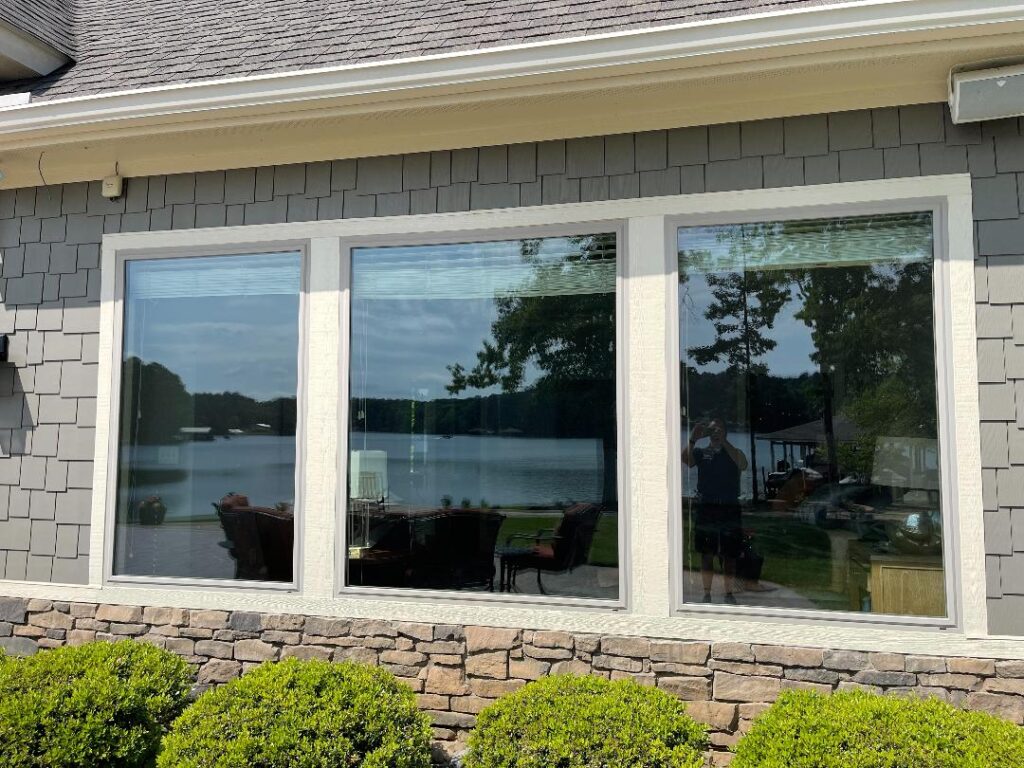Residential Window Tint: A Guide to Choosing the Right Shade
Residential Window Tint: A Guide to Choosing the Right Shade
Blog Article
How Residential Home Window Tinting Improves Your Home's Power Efficiency
Residential window tinting provides an engaging option for property owners seeking to improve power efficiency within their living spaces. By applying specialized films to windows, it successfully lowers heat transfer, thus supporting interior temperature levels and minimizing the need for excessive heating or cooling.
Comprehending Home Window Tinting
Comprehending home window tinting is crucial for homeowners seeking to enhance both comfort and energy efficiency in their home. Residential Window Tint. Window tinting involves the application of a thin film to the interior or exterior surface area of glass home windows. This movie can significantly modulate the quantity of sunshine and warmth that gets in a home, hence affecting interior environment problems
There are different types of home window tinting films available, each with distinctive properties. The performance of window tinting is frequently gauged by its Visible Light Transmission (VLT) portion, which indicates just how much light can pass with the movie.
Benefits of Power Effectiveness
Window tinting not just enhances visual appeals yet likewise plays a substantial function in improving power efficiency within residential rooms. By decreasing warmth transfer with home windows, tinted movies create a much more secure indoor environment, which can result in substantial reductions in energy intake for heating & cooling. This energy effectiveness converts into reduced utility expenses, providing house owners with substantial long-lasting financial savings.

Furthermore, window tinting enhances the convenience of living areas. By minimizing glow and blocking dangerous UV rays, tinted home windows produce a more pleasant setting, which can result in improved health for residents. The protection versus UV rays also aids protect furniture and floor covering from fading, contributing to the long life of home items.
Exactly How Tinting Works
Tinting movies operate via a combination of innovative materials and modern technologies created to control the quantity of solar energy getting in a home. Mainly made up of polyester, these films often integrate metallic or ceramic bits that reflect and soak up heat. This double capability permits them to considerably decrease the infiltration of ultraviolet (UV) rays and infrared radiation while allowing noticeable light to go through.
The effectiveness of home window tinting is determined by its solar warmth gain coefficient (SHGC), which suggests just how much solar power is sent with the window. Lower SHGC worths are more suitable as they signify better heat being rejected. In addition, window tints can include a selection of shades, allowing house owners to tailor their aesthetic this contact form preferences while improving power performance.
Furthermore, his response these films serve as a barrier, stopping warm loss throughout colder months by showing interior heat back right into the living room. This thermal insulation effect complements the cooling benefits acquired during warmer months, adding to a balanced indoor climate year-round. By handling solar power successfully, household home window tinting not just boosts convenience yet additionally plays a vital role in reducing energy intake and decreasing utility bills.
Picking the Right Tint

There are different sorts of window movies available, consisting of dyed, metalized, and ceramic. Dyed films are economical but may have restricted toughness. Metalized films supply better warmth rejection however can interfere with digital signals. Ceramic movies provide exceptional warmth control without jeopardizing presence and are highly resilient, making them a preferred choice.
Visible light transmission (VLT) is an additional vital element, as it suggests the amount of natural light that can pass through the tinted glass. Property owners need to pick a color with a VLT that enhances their illumination choices while still supplying ample glow decrease.
In addition, analyzing the solar warmth gain coefficient (SHGC) can aid establish just how well a color can obstruct warm from sunshine. A lower SHGC shows far better warmth control, inevitably improving energy effectiveness.
Installation and Upkeep Tips
Correct setup and look at this website maintenance are crucial components in maximizing the advantages of residential window tinting. Specialists likewise make use of specialized tools and strategies, which can enhance the longevity and effectiveness of the color.
Adhering to setup, upkeep is necessary to extend the life of the home window film. It is suggested to wait a minimum of 1 month prior to cleaning the tinted home windows to permit the adhesive to cure fully. When cleaning, utilize a soft fabric and a gentle, ammonia-free cleaner to stay clear of damaging the movie. Avoid unpleasant materials that could scrape the surface.
In addition, regular assessments are valuable. Look for any peeling or bubbling, which might suggest inappropriate installment or put on over time - Residential Window Tint. Dealing with these problems immediately can protect against further damages and keep energy efficiency. By adhering to these installment and upkeep tips, property owners can ensure their window tinting continues to provide significant energy savings and convenience for many years to find.
Final Thought
In verdict, property home window tinting serves as a reliable service for boosting energy performance within homes. By reducing warm transfer and obstructing dangerous UV rays, window movies add to reduce power consumption and boosted indoor comfort.
Window tinting entails the application of a slim film to the interior or outside surface area of glass windows. By decreasing warm transfer via windows, colored movies create a much more secure indoor climate, which can lead to substantial reductions in energy intake for home heating and air conditioning.The efficiency of home window tinting is gauged by its solar warm gain coefficient (SHGC), which shows how much solar power is transmitted with the home window. By managing solar energy successfully, household window tinting not just boosts comfort however also plays an important duty in reducing energy usage and decreasing energy bills.
By decreasing warm transfer and obstructing unsafe UV rays, home window movies contribute to lower energy intake and boosted interior convenience.
Report this page